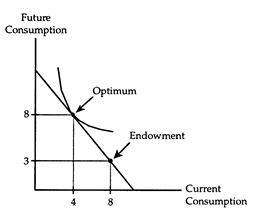The purpose of an effluent fee imposed on a firm is
A. to increase output of its product by reducing the resources allocated to production.
B. to increase output of its product by increasing the resources allocated to production.
C. to reduce output by increasing production costs thereby reducing resources used.
D. None of these
Answer: C
You might also like to view...
To maximize profit, a firm in monopolistic competition will produce the quantity where marginal revenue
A) is greater than marginal cost. B) equals zero. C) is less than marginal cost. D) equals marginal cost. E) equals average total cost.
Refer to Current and Future Consumption. The diagram shows the case of a

a. representative agent.
b. net borrower.
c. net lender.
d. disequilibrium situation.
Which of the following statements is false?
A) Domestic income is the total income earned by the people and businesses within a country's borders. B) National income is the total income earned by U.S. citizens and businesses, no matter where they reside or are located. C) Corporate profits is the largest component of national income. D) National income = compensation of employees + proprietors' income + corporate profits + rental income + net interest.
Inflation increases uncertainty in the markets because:
A. consumers must put more effort into shopping to find the best price. B. it is more difficult to stay aware of how one product compares in cost to another. C. sellers raise the prices of their products very gradually and predictably.